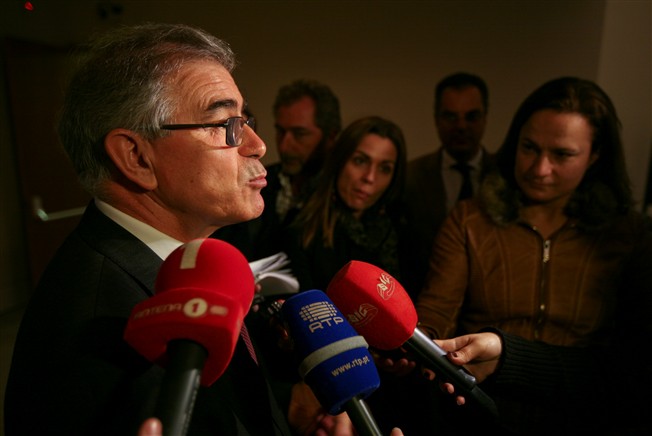«A mão invisível de que os ultraliberais tanto falam, tornou-se infelizmente, bem visível na vida dos portugueses, essa mão empobreceu os portugueses, aumentou as desigualdades e está a destruir a classe média. (...) Este é o tempo da coragem (...) para a construção de uma democracia de confiança, onde política e negócios não se misturem e a justiça não prescreve para os poderosos» salientou muito bem António José Seguro no dia 25 de Abrril de 2014.
Mas há muitas mãos que viciam os jogos a favor de muitos interesses e que durante XL anos de Democracia se aproveitaram das oportunidades, sob a cobertura dos vermelhos stalinistas autocratas ou dos laranjas aculturados, tendo como meio de acção o Estado, Instituições Financeiras, ppp, swaps, mais valias, betão, o alcatrão, os farmácos, os automóveis, os submarinos, que inundaram Portugal de importações, défices e dívidas públicas».
Uma mão de que o economista escocês falava era a seguinte:
«The rich … consume little more than the poor, and in spite of their natural selfishness and rapacity, though they mean only their own conveniency, though the sole end which they propose from the labours of all the thousands whom they employ, be the gratification of their own vain and insatiable desires, they divide with the poor the produce of all their improvements. They are led by an invisible hand (...)» Adam Smith
The Theory of Moral Sentiments (1759)
Karl Marx: «The right of man to property is the right to enjoy
his possessions and dispose of the same arbitrarily, without regard for
other men, independently from society, the right of selfishness.»
Barack Obama «to make a virtue out of selfishness»
- Nor is the question before us whether the market is a force for good or ill. Its power to generate wealth and expand freedom is unmatched, but this crisis has reminded us that without a watchful eye, the market can spin out of control — and that a
nation cannot prosper long when it favors only the prosperous. The
success of our economy has always depended not just on the size of our Gross Domestic Product, but on the reach of our prosperity;
on our ability to extend opportunity to every willing heart — not out
of charity, but because it is the surest route to our common good.
- 'We're Going To Reshape Mean Spirited Selfish ..... The fact that we are here today to debate raising America's debt limit is a sign of leadership failure. ...... I think when you spread the wealth around, it's good for everybody
The point is, though, that — and it’s not just charity,
it’s not just that I want to help the middle class and working people
who are trying to get in the middle class — it’s that when we actually
make sure that everybody’s got a shot – when young people can all go to
college, when everybody’s got decent health care, when everybody’s got a
little more money at the end of the month – then guess what? Everybody
starts spending that money, they decide maybe I can afford a new car,
maybe I can afford a computer for my child. They can buy the products
and services that businesses are selling and everybody is better off.
All boats rise. That’s what happened in the 1990s, that’s what we need
to restore. And that’s what I’m gonna do as president of the United
States of America.
“John McCain and Sarah Palin they call this socialistic,” Obama
continued. “You know I don’t know when, when they decided they wanted to
make a virtue out of selfishness.”
Jake Tapper thinks this is a nod to Ayn Rand’s book, The Virtue of Selfishness.
É a questão da objectividade versus subjectividade: a escravatura, a servidão e a exploração têm dimensões objectivas e subjectivas, têm leis histórico-sociais que se manifestam na subjectividade com limites objectivos e na objectividade com limites subjectivos, numa dinâmica dialéctica de evolução e transformação.
Karl Marx approach is very interesting:
«The Secret of Primitive Accumulation
(...)
The economic structure of capitalist society has
grown out of the economic structure of feudal society. The
dissolution of the latter set free the elements of the
former.
The immediate producer, the labourer, could only
dispose of his own person after he had ceased to be attached
to the soil and ceased to be the slave, serf, or bondsman
of another. To become a free seller of labour power, who
carries his commodity wherever he finds a market, he must
further have escaped from the regime of the guilds, their
rules for apprentices and journeymen, and the impediments of
their labour regulations. Hence, the historical movement
which changes the producers into wage-workers, appears, on
the one hand, as their emancipation from serfdom and from
the fetters of the guilds, and this side alone exists for
our bourgeois historians. But, on the other hand, these new
freedmen became sellers of themselves only after they had
been robbed of all their own means of production, and of all
the guarantees of existence afforded by the old feudal
arrangements. And the history of this, their expropriation,
is written in the annals of mankind in letters of blood and
fire.
The industrial capitalists, these new potentates,
had on their part not only to displace the guild masters of
handicrafts, but also the feudal lords, the possessors of
the sources of wealth. In this respect, their conquest of
social power appears as the fruit of a victorious struggle
both against feudal lordship and its revolting prerogatives,
and against the guilds and the fetters they laid on the free
development of production and the free exploitation of man
by man. The chevaliers d’industrie, however, only succeeded
in supplanting the chevaliers of the sword by making use of
events of which they themselves were wholly innocent. They
have risen by means as vile as those by which the Roman
freedman once on a time made himself the master of his
patronus.
The starting point of the development that gave
rise to the wage labourer as well as to the capitalist, was
the servitude of the labourer. The advance consisted in a
change of form of this servitude, in the transformation of
feudal exploitation into capitalist exploitation. To
understand its march, we need not go back very far. Although
we come across the first beginnings of capitalist production
as early as the 14th or 15th century, sporadically, in
certain towns of the Mediterranean, the capitalistic era
dates from the 16th century. Wherever it appears, the
abolition of serfdom has been long effected, and the highest
development of the middle ages, the existence of sovereign
towns, has been long on the wane.
In the history of primitive accumulation, all
revolutions are epoch-making that act as levers for the
capital class in course of formation; but, above all, those
moments when great masses of men are suddenly and forcibly
torn from their means of subsistence, and hurled as free and
“unattached” proletarians on the labour-market. The
expropriation of the agricultural producer, of the peasant,
from the soil, is the basis of the whole process. The
history of this expropriation, in different countries,
assumes different aspects, and runs through its various
phases in different orders of succession, and at different
periods. In England alone, which we take as our example, has
it the classic form.*
*In Italy, where capitalistic production developed earliest,
the dissolution of serfdom also took place earlier than
elsewhere. The serf was emancipated in that country before
he had acquired any prescriptive right to the soil. His
emancipation at once transformed him into a free
proletarian, who, moreover, found his master ready
waiting for him in the towns, for the most part handed down
as legacies from the Roman time. When the revolution of the
world-market, about the end of the 15th century, annihilated
Northern Italy’s commercial supremacy, a movement in the
reverse direction set in. The labourers of the towns were
driven
en masse into the country, and gave an
impulse, never before seen, to the
petite culture,
carried on in the form of gardening.» Karl Marx
Capital (1867)



















